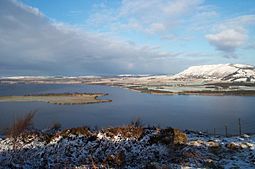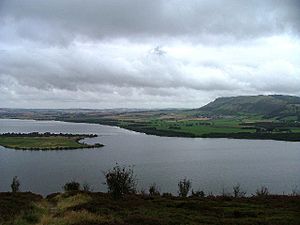St Serf's Inch facts for kids
 St Serf's Inch and Loch Leven in winter, from Vane Farm on Benarty Hill |
|
| OS grid reference | NO161003 |
|---|---|
| Coordinates | 56°11′N 3°21′W / 56.19°N 3.35°W |
| Physical geography | |
| Island group | Loch Leven |
| Area | 31 ha |
| Area rank | (Freshwater: 12) |
| Highest elevation | 114 m asl |
| Administration | |
| Sovereign state | United Kingdom |
| Country | Scotland |
| Council area | Perth and Kinross |
| Demographics | |
| Population | 0 |
St Serf's Inch or St Serf's Island is a small island in Loch Leven, located in south-eastern Perth and Kinross, Scotland. For many years, it was home to a special religious community. This community started with a group called the Culdees and later became Augustinian monks, who lived at St Serf's Inch Priory.
Contents
A Glimpse into the Island's Past
St Serf's Island has a very long and interesting history. A religious community lived on the island for many centuries. This community was already very old by the 1100s.
Ancient Records and Royal Gifts
The monks on the island kept important records, which were like official documents. These records were first written in the old Gaelic language. Later, in the late 1100s, they were translated into Latin.
From these old documents, we know that Macbeth, who was the King of Scots, and his wife Gruoch, gave land to the priory. This was a gift to help support the monks and their work.
Other important people also gave gifts to the monastery. These included Máel Dúin, a Bishop of St Andrews, and his successors. Even King Máel Coluim III (who ruled from 1058 to 1093) and his wife Margaret made donations. King Domnall Bán also contributed to the priory.
A Medieval Trial on the Island
Around the year 1128, a special trial took place on St Serf's Island. It was led by Causantín, who was a powerful leader in Fife. The trial was about a man named Robert "the Burgundian." He was one of the first French settlers in Scotland, north of the Forth River. The monks of St Serf had a problem with Robert's behavior. In the end, the trial decided in favor of the monks.
Macbeth's Stories and Shakespeare
One of the leaders of the monastery, named Andrew of Wyntoun, lived in the 1400s. He wrote a famous history book called Oryginalle Cronykil of Scotland. In his book, Andrew wrote some interesting stories about King Macbeth.
Andrew of Wyntoun's stories about Macbeth were quite famous. He even included some tales that were later used by William Shakespeare in his famous play, Macbeth. For example, Andrew wrote about a prophecy that Macbeth would not be killed by a man born of a woman. He also mentioned Macbeth meeting three "Weird Sisters" who told him about his future. Another famous part was the prophecy that Macbeth would only fall when the wood of Birnam came to Dunsinane. These stories show how important St Serf's Island was to Scottish history and literature.
 | Bessie Coleman |
 | Spann Watson |
 | Jill E. Brown |
 | Sherman W. White |


